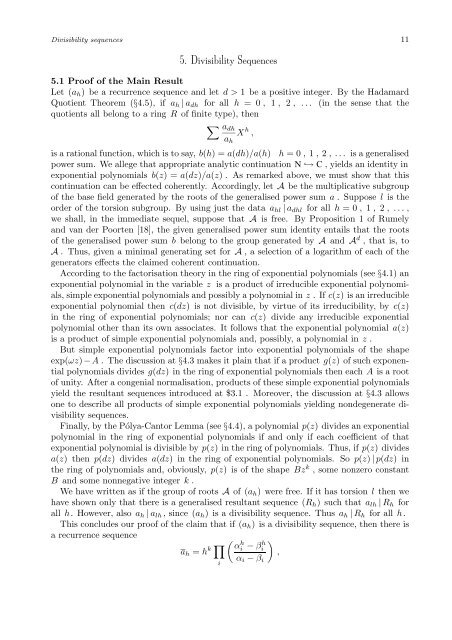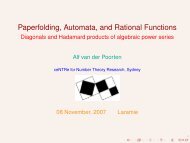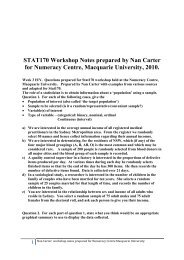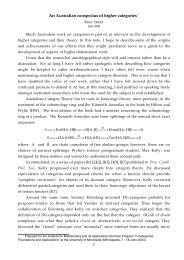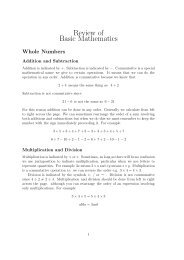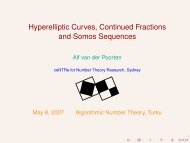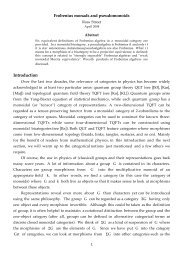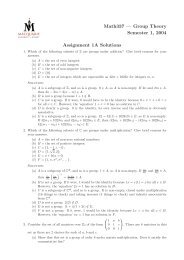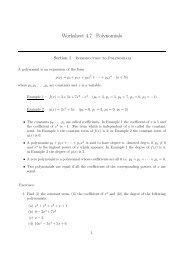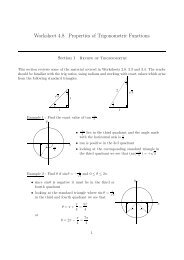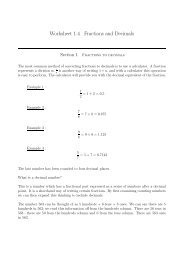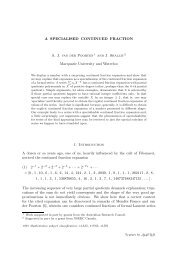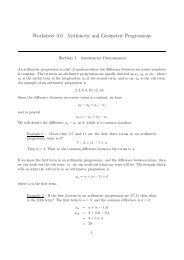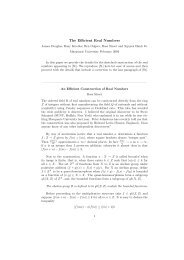A FULL CHARACTERISATION OF DIVISIBILITY SEQUENCES ...
A FULL CHARACTERISATION OF DIVISIBILITY SEQUENCES ...
A FULL CHARACTERISATION OF DIVISIBILITY SEQUENCES ...
Create successful ePaper yourself
Turn your PDF publications into a flip-book with our unique Google optimized e-Paper software.
Divisibility sequences 11<br />
5. Divisibility Sequences<br />
5.1 Proof of the MainResult<br />
Let (ah) be a recurrence sequence and let d>1 be a positive integer. By the Hadamard<br />
Quotient Theorem (§4.5), if ah | adh for all h = 0 , 1 , 2 , . . . (in the sense that the<br />
quotients all belong to a ring R of finite type), then<br />
adh<br />
ah<br />
is a rational function, which is to say, b(h) =a(dh)/a(h) h = 0 , 1 , 2 , . . . is a generalised<br />
power sum. We allege that appropriate analytic continuation N ↩→ C , yields an identity in<br />
exponential polynomials b(z) =a(dz)/a(z) . As remarked above, we must show that this<br />
continuation can be effected coherently. Accordingly, let A be the multiplicative subgroup<br />
of the base field generated by the roots of the generalised power sum a . Suppose l is the<br />
order of the torsion subgroup. By using just the data ahl | adhl for all h =0,1,2,...,<br />
we shall, in the immediate sequel, suppose that A is free. By Proposition 1 of Rumely<br />
and van der Poorten [18], the given generalised power sum identity entails that the roots<br />
of the generalised power sum b belong to the group generated by A and Ad , that is, to<br />
A . Thus, given a minimal generating set for A , a selection of a logarithm of each of the<br />
generators effects the claimed coherent continuation.<br />
According to the factorisation theory in the ring of exponential polynomials (see §4.1) an<br />
exponential polynomial in the variable z is a product of irreducible exponential polynomials,<br />
simple exponential polynomials and possibly a polynomial in z .Ifc(z) is an irreducible<br />
exponential polynomial then c(dz) is not divisible, by virtue of its irreducibility, by c(z)<br />
in the ring of exponential polynomials; nor can c(z) divide any irreducible exponential<br />
polynomial other than its own associates. It follows that the exponential polynomial a(z)<br />
is a product of simple exponential polynomials and, possibly, a polynomial in z .<br />
But simple exponential polynomials factor into exponential polynomials of the shape<br />
exp(ωz) − A . The discussion at §4.3 makes it plain that if a product g(z) of such exponential<br />
polynomials divides g(dz) in the ring of exponential polynomials then each A isaroot<br />
of unity. After a congenial normalisation, products of these simple exponential polynomials<br />
yield the resultant sequences introduced at $3.1 . Moreover, the discussion at §4.3 allows<br />
one to describe all products of simple exponential polynomials yielding nondegenerate divisibility<br />
sequences.<br />
Finally, by the Pólya-Cantor Lemma (see §4.4), a polynomial p(z) divides an exponential<br />
polynomial in the ring of exponential polynomials if and only if each coefficient of that<br />
exponential polynomial is divisible by p(z) in the ring of polynomials. Thus, if p(z) divides<br />
a(z) then p(dz) divides a(dz) in the ring of exponential polynomials. So p(z) | p(dz) in<br />
the ring of polynomials and, obviously, p(z) is of the shape Bzk , some nonzero constant<br />
B and some nonnegative integer k .<br />
We have written as if the group of roots A of (ah) were free. If it has torsion l then we<br />
have shown only that there is a generalised resultant sequence (Rh) such that alh | Rh for<br />
all h. However, also ah | alh , since (ah) is a divisibility sequence. Thus ah | Rh for all h.<br />
This concludes our proof of the claim that if (ah) is a divisibility sequence, then there is<br />
a recurrence sequence<br />
<br />
h<br />
k αi − β<br />
ah = h h <br />
i<br />
,<br />
i<br />
X h ,<br />
αi − βi


